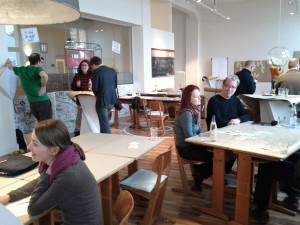Last week, I found myself in Hamburg locked in a room for two days with 16 strangers. Our mission was to tackle the question “What is code and how does it control us?”. I loathe team building exercises, but really, I was more frightened about the complete lack of presentations and roundtables. Without this safety net, I was unsure of how this whole thing was going to go down. I predicted a crash-and-burn of epic proportions, interspersed with awkward silences and coffee breaks. However, I was wrong. I came away from Hamburg inspired, with new collaborative projects planned – including one on Marxist Platform Studies, which I can’t wait to start working on.
The Code as Control Workshop was the brainchild of Sebastian Deterding, and brought to life with his colleagues (Jan-Hinrik Schmidt, Stephan Dreyer, Nele Heise, and Katharina Johnsen). The Hans Bredow Institute for Media Research flew in 17 researchers from across North America and Europe to discuss how code regulates, and in doing so, develop shared methodologies, theoretical frameworks, and research questions that would bridge our diverse disciplines. (I was tapped for this project because of this article on how developers control players).
During these two days we thought-up, voted on, and joined collaborative mini-projects. For example, one afternoon Jeffrey MacKie-Mason, Stephan, Nele and I attacked the question “what is code literacy? And what do non-coders need to know about code?”. We felt that this issue intersects with media literacy and information studies, both topics that are increasingly mandatory in secondary education. Yet, a similar instructional direction for code is missing. Without knowing the basics of how code operates, non-coders find themselves at a disadvantage, unable to understand or argue with the devices that structure everything from our spaces of play, to email, to online searches, to home thermostats, to work time-sheets, to online classrooms. (For a great article on the hidden role that algorithms and code play see this paper by Tarleton Gillespie). Accordingly, we spent part of the afternoon developing a syllabus for teaching code literacy to entry-level university students. Other teams were tasked with developing research methodologies, building literature reviews, outlining research agendas on self-regulation, role-playing as computer algorithms. Yup. Role-playing as algorithms. Shades of Parsely Games. (If you haven’t heard of Parsely, check out this librarian’s sales video explaining what they are).
Locked in a room in Hamburg I felt at home. I was surrounded not by a discipline but what Sebastian calls “a family of choice”, researchers who share an interest in code regardless of whether they’re from comp sci or geography, a think-tank or a university research centre. This home was made more welcoming by a surprisingly large number of this group, including Nicholas Nova, Sebastian Deterding, Dan Lockton and Vili Lehdonvirta, who – like me – are interested in the context of persuasive technology, games and regulation, (from the economics of virtual worlds and online labour to playful design to gamification). If you too are interested in these questions, I suggest you hunt them down and read their work. It might give you ammo for small talk if you ever find yourself trapped in a room with them for two days.

